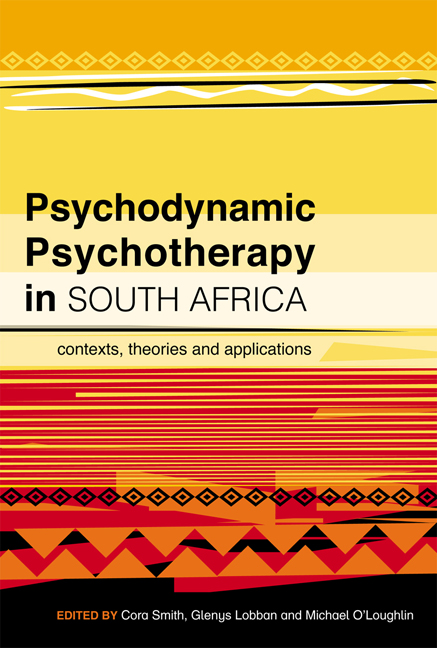Book contents
- Frontmatter
- Contents
- Editors
- Contributors
- Acknowledgements
- Acronyms
- Introduction Cora Smith
- Section I Subjectivity and identity
- Chapter 1 Naming and otherness: South African intersubjective psychoanalytic psychotherapy and the negotiation of racialised histories
- Chapter 2 Raising the colour bar: Exploring issues of race, racism and racialised identities in the South African therapeutic context
- Chapter 3 Subjectivity and identity in South Africa today
- Section II Traumatic stress
- Section III Social issues
- Afterword Glenys Lobban and Michael O'Loughlin
- Index
Chapter 3 - Subjectivity and identity in South Africa today
from Section I - Subjectivity and identity
Published online by Cambridge University Press: 21 April 2018
- Frontmatter
- Contents
- Editors
- Contributors
- Acknowledgements
- Acronyms
- Introduction Cora Smith
- Section I Subjectivity and identity
- Chapter 1 Naming and otherness: South African intersubjective psychoanalytic psychotherapy and the negotiation of racialised histories
- Chapter 2 Raising the colour bar: Exploring issues of race, racism and racialised identities in the South African therapeutic context
- Chapter 3 Subjectivity and identity in South Africa today
- Section II Traumatic stress
- Section III Social issues
- Afterword Glenys Lobban and Michael O'Loughlin
- Index
Summary
In this chapter South African subjectivities and identities will be explored. Mama defines subjectivity as ‘the conscious and unconscious thoughts and emotions of the individual, her sense of herself and her ways of understanding her relation to the world’ (1995: 2). She argues that subjectivity is constructed through the ‘constant resonance between psychodynamics and social experience’ (1995: 133). Historically, psychologists have tended to address identity and subjectivity at the micro level, focusing on a particular individual patient and how she1 sees herself at both the conscious and the unconscious levels, how her subjectivity developed and the interventions which could be used to help her to expand and transform her sense of identity. This approach has been critiqued in recent years and a new crop of analytic theorists have argued that we cannot understand the individual separate from her social milieu and that individual and social factors are inter-implicated in the development of subjectivity and identity (see Dimen, 2011).
Questions about how identity should be defined are especially evocative in the South African context. In apartheid South Africa the state played a particularly obtrusive role in the constitution of subjectivities, which made it patently obvious that identity was not simply an individual choice. Under apartheid, the government ‘went to macabre lengths to distinguish groups by race’ (Orkin & Jowell, 2006: 284) and racial identity was externally imposed on all individuals, who were defined as either ‘white’ or ‘non-white’ (Africans, Indians, Asians, coloureds). Ethnicity/race was elevated as the superordinate category for defining identity in the apartheid state, which also ‘denied a sense of “South Africanness” to the majority of citizens’ (Grossberg et al., 2006: 72). The government ‘enforced social and spatial segregation between ethnic groups both to satisfy the dominant ideology and to ensure differential access to resources and power’ (Orkin & Jowell, 2006: 284). The doctrine of white supremacy had a profoundly negative impact on individuals who were classified as not ‘white’, an impact that affected both their material circumstances and their psyche and self-evaluations (Biko, 1970, 1971). Those classified as ‘white’ under apartheid reaped material benefits, but their sense of identity was also racialised and circumscribed.
- Type
- Chapter
- Information
- Psychodynamic Psychotherapy in South Africacontexts, theories and applications, pp. 54 - 74Publisher: Wits University PressPrint publication year: 2013



